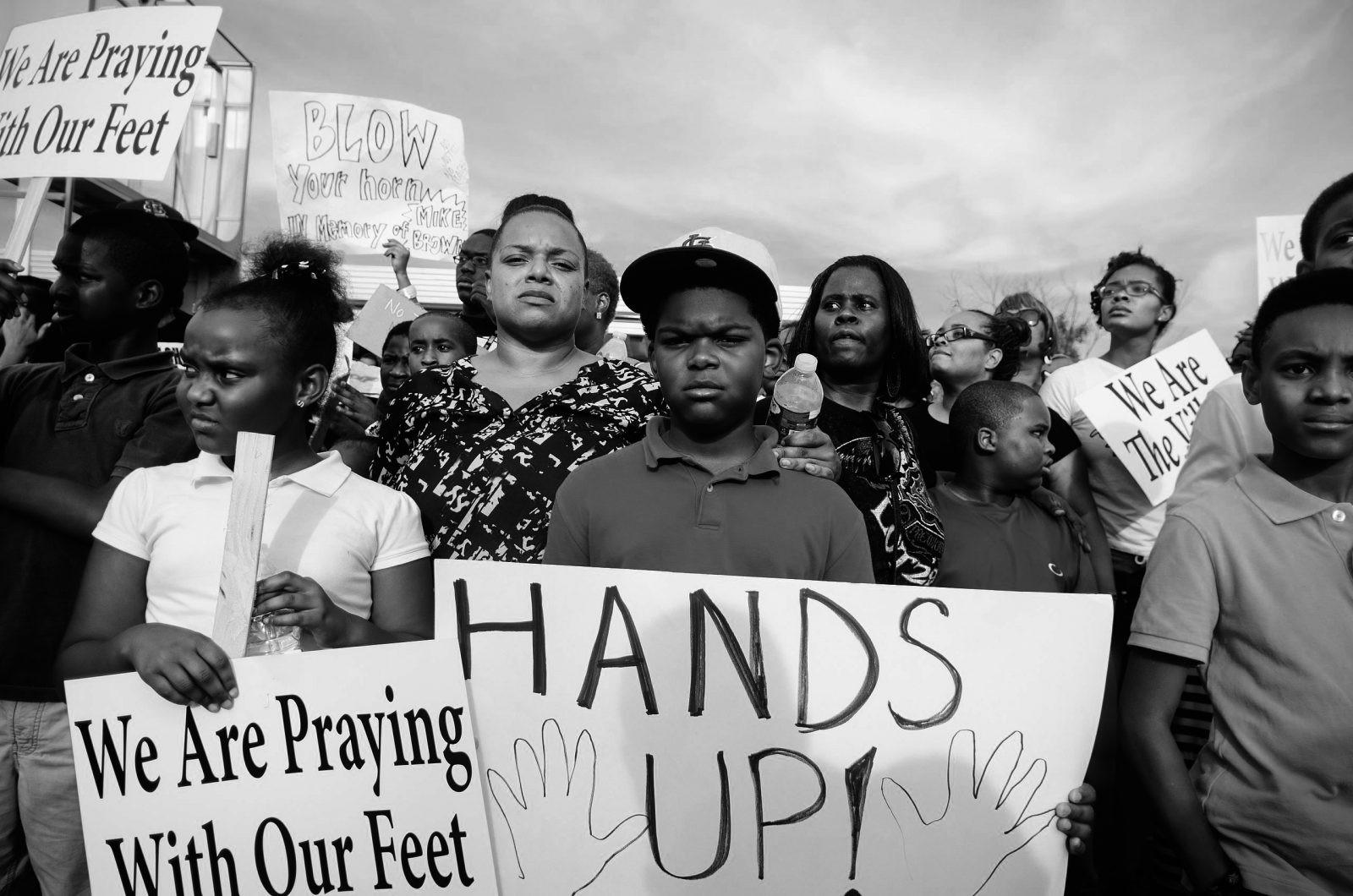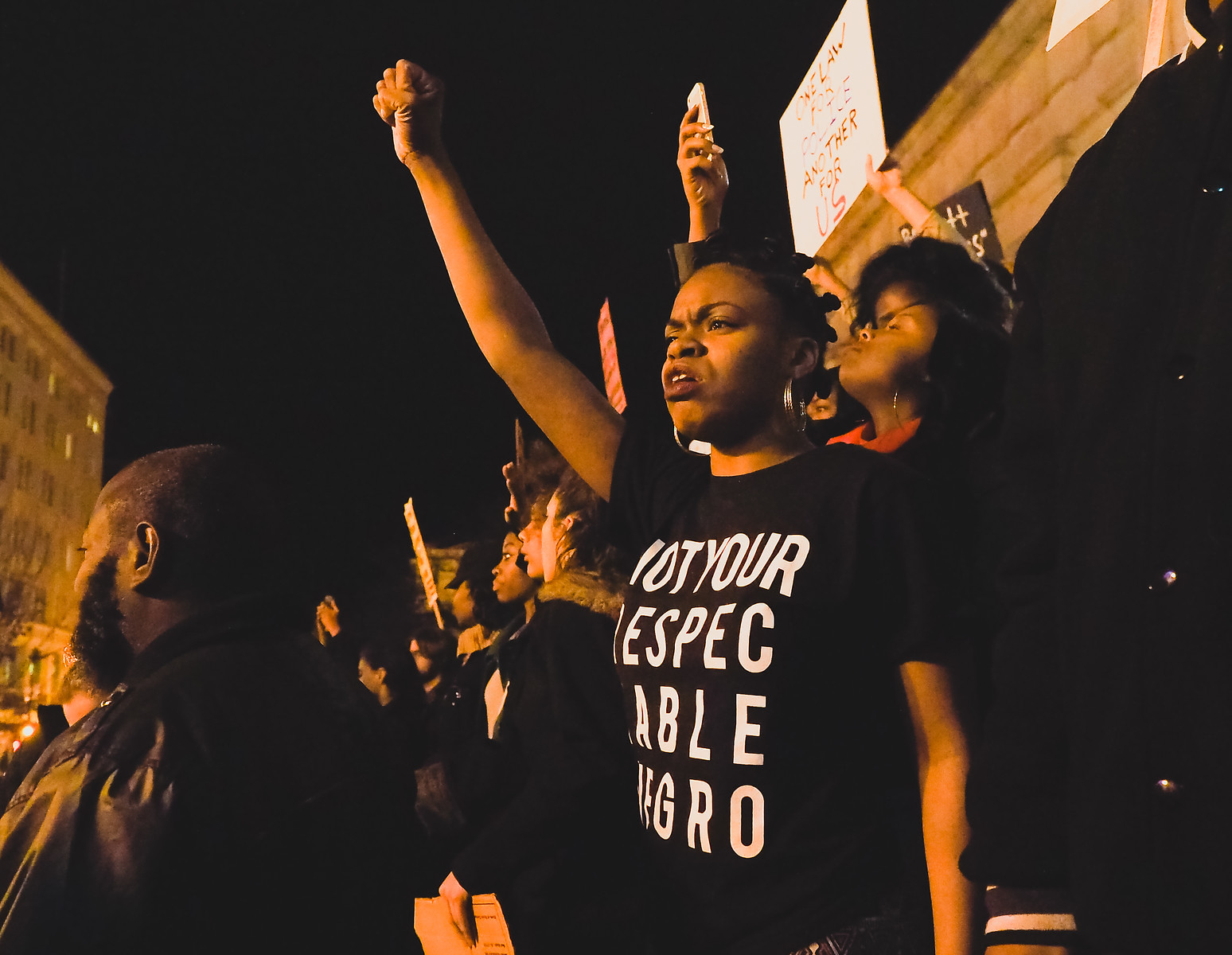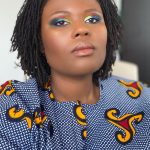The poems below are drawn from interviews I conducted with Black mothers living in publicly subsidized housing in Washington, D.C. They are part of a larger collection of “empirical poetry”—data-based poems that illuminate core insights from research by focusing solely on the participants’ words, as curated into poetic form. As applied here, this approach intends to center the dignity, complexity, and humanity of these mothers while making “insinuative” arguments about what it means to be poor, Black, and living under the carceral state in the United States.
Each poem is drawn from a single participant’s words. Collectively, these poems feature themes of estrangement, anger, amor fati, ambivalence, arbitrariness, resentment, resignation, resistance, loss, and love. The poems emphasize how seemingly normal safety practices threaten a whole range of human experiences—from sitting on the porch, to riding the bus, to raising children, to getting married.

From the series
Ferguson at Ten
How the police killing of Michael Brown a decade ago propelled the modern decarceral movement.
The poetic form invites readers to linger over each line and word, in hopes that readers use imagination and reverie, not only logic, to process these implicit arguments. Poetry has the power to help us grow past the stale and rote ways of thinking about safety that tend to characterize policy discussions.
As we reflect upon a decade since the killing of Michael Brown in Ferguson, Missouri, we should resist the macabre tendency to observe and respond to only the most spectacular manifestations of police violence. The Ferguson Commission’s report offered an example of the thinking we need to reinvigorate today, presenting a capacious narrative of the events in Ferguson and a comprehensive set of calls to action. The commission reached beyond the most direct-seeming deterrents for police violence and focused on an array of barriers to racial equity, including the everyday activities of police, courts, schools, and other institutions that structure our lives.
For too long, many have passively accepted what scholars have called the “slow violence” of mundane police and punishment practices that produce community exclusion, seeing them as inevitable. Yet, it is routine practices and processes that drive the steady drumbeat of killings like those of Brown. And Sonya Massey. This state of affairs is still unacceptable.
A Love Poem (Yvonne)
I was in love.
We did everything.
Together.
I was in love,
I got locked up.
We was together
three years, wasn’t married a year
before I got locked up.
We wasn’t together
for over five years ’cause
he was locked up.
When I got locked up
and I came home, he was in.
Came home last year.
Got a divorce last year—
It wasn’t even really a marriage
Their Jobs (Brandi)
I try not to get involved with the police—
I don’t do anything wrong.
Nobody does anything to me.
My boyfriend was leaving. Out of nowhere
The police came: run up on him
Undercover: had on regular clothes.
My boyfriend was walking out the door. They
confused him for someone else. They
pointed a gun on him.
We was trying to tell:
He just left out my house. Y’all
got the wrong person.
They ran his information. They
said they was looking for a Black male. They
identified him because he was Black. They
knew they had the wrong person. Weird.
One time we was
on the bus.
The police got him
off the bus. They
was looking for somebody who had on a
red-and-black North Face.
The police had to do their job.
In this neighborhood
that description fits
Everybody: any Black male.
Three times it happened:
Upset. Angry. He know
why they pulling him over.
I can’t argue with them. They saying
They just doing they jobs
Noise Violations (Julia)
Sometimes the music get loud
I call the po-po—
there’s music playing. one o’clock
I have to get up and go to church.
If you call the police
If you’re lucky
they might come
they might not show up—
depends on where you live at.
If they’re having a good day
they might come in twenty minutes
they might show up
they might come in four hours
they might not show up.
If you say:
a cop down!
a white person down!
One second.
I said:
there’s a party going on and it’s loud!
Forty minutes.
I don’t say it’s me.
They know it was me. Probably
These young people: they ain’t crazy—
Ms. Julia! would have them
buried somewhere. Probably
Baseball (Katina)
Summertime
When the games going
They patrol the area a lot
The white people are walking. To the cars
They need to protect them. To make sure
We aren’t doing nothing that’s going to. Harm them. Hell—
They come through our street. Shit—
Make sure. They aren’t going to
Harm us.
Open Containers (Katina)
The other day we were out there
two of them rode up. They waited until
three more came.
They rode into the court—
Anyone got alcohol in their cups?
Don’t question me.
If you don’t smell it in the area
Don’t smell my cup. Or—
Smell it.
I can file harassment against you.
I don’t say hi
I don’t say bye
I don’t say anything
I laugh at them
when the police
come around on bikes.
They come and be like—
Anyone got liquor in your cup?
I get offended
for the police to come around
and ask me that.
I don’t say hi
I don’t say bye
I don’t want to joke with you
What’s in my cup?
I’m sittin out front,
nine times outta ten it’s soda. Or water.
If I do drink, I know—
That’s against the Law.
Every once in a while
I’m going to take my chance.
I need that break. But
I have enough sense—
I’m not giving you
Thirty-five dollars. To get out of jail.
Don’t ask me what’s in my cup
Header image: Protesters gather in Washington, D.C., the day after a grand jury failed to return an indictment against police officer Darren Wilson over the killing of Michael Brown in Ferguson, Missouri. (Image: Jon Newman/Flickr)

